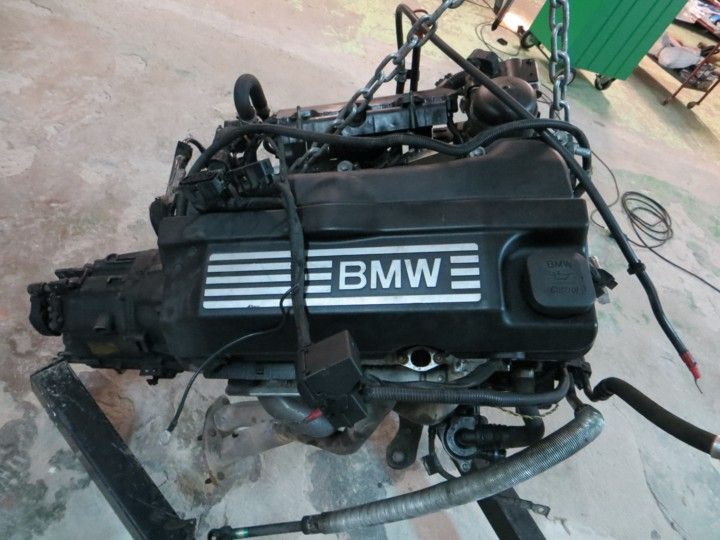BMW 318ti: Efficiency Specifications and Characteristics Explained
BMW 318ti: Efficiency Specifications and Characteristics Explained
Blog Article
Trick Attributes to Seek When Purchasing an Engine for Automotive Applications
When considering the purchase of an engine for auto applications, a number of vital features necessitate careful examination to ensure ideal efficiency and performance. From power and efficiency capabilities to fuel efficiency, adherence, and sturdiness to discharges criteria, each facet plays an important function in establishing the engine's suitability for particular vehicle demands.
Power and Efficiency
When selecting an automobile engine, buyers focus on power and efficiency to ensure optimal driving experience and effectiveness. The power outcome of an engine, usually measured in horse power (HP) or kilowatts (kW), determines the velocity, full throttle, and total capacities of a lorry. Greater power rankings usually cause quicker velocity and far better efficiency, specifically throughout overtaking or bring heavy tons. Performance, on the various other hand, incorporates a more comprehensive range of features, consisting of gas performance, emissions, integrity, and overall driving dynamics. A well-performing engine not just supplies power effectively but also operates smoothly throughout various speed varieties and driving problems.
In addition, elements such as engine hybrid, turbocharging, and displacement innovations play significant roles in improving both power and efficiency degrees. Ultimately, choosing an engine that uses a potent mix of power and efficiency makes certain a efficient and rewarding driving experience.
Gas Efficiency
Maximizing fuel performance is an extremely important consideration for consumers when assessing automotive engine alternatives. The performance of an engine directly affects operating costs and ecological impact. One essential factor influencing gas efficiency is the engine's style and modern technology. Modern engines with functions like straight fuel shot, turbocharging, and variable shutoff timing can substantially enhance gas performance by enhancing burning processes and minimizing power loss. Furthermore, the total weight of the engine and car, along with the aerodynamics, play important roles in establishing fuel usage.

Toughness and Reliability
Attaining lasting efficiency and trustworthy operation is necessary for consumers reviewing the toughness and dependability of automotive engines. When thinking about an engine for automotive applications, toughness refers to the engine's capability to hold up against wear, tension, and harsh operating conditions over an extensive period. Integrity, on the other hand, suggests that the engine can consistently do its intended feature without unexpected malfunctions or failings.
Consumers need to search for engines created with top quality materials and specific engineering to guarantee durability. Elements such as pistons, bearings, and crankshafts must be sturdy to handle the engine's power output without premature wear. Furthermore, engines equipped with advanced cooling systems, efficient lubrication, and robust filtering systems have a tendency to show greater degrees of integrity.
Normal upkeep and adherence to supplier referrals are additionally critical consider preserving an engine's resilience and reliability. By following maintenance schedules, using advised liquids, and resolving any kind of concerns immediately, consumers can maximize the life-span and efficiency of their vehicle engines. Eventually, prioritizing resilience and reliability in engine option can bring about a much more rewarding ownership experience with less unanticipated disruptions.
Emissions Conformity
Making certain conformity with discharges regulations is a vital aspect of reviewing vehicle engines for Your Domain Name ecologically conscious customers. With boosting issues concerning air high quality and environmental impact, rigorous discharges link standards have actually been implemented worldwide to reduce unsafe contaminants released right into the environment. When purchasing an engine for vehicle applications, it is necessary to consider its exhausts compliance to decrease the carbon footprint and follow legal needs.
Modern engines are geared up with innovative discharge control technologies such as catalytic converters, exhaust gas recirculation (EGR) systems, and careful catalytic reduction (SCR) to minimize hazardous exhaust gases like nitrogen oxides (NOx), carbon monoxide gas (CO), and hydrocarbons (HC) These systems play an essential duty in making sure that the engine meets the specified exhausts criteria and runs within acceptable restrictions.

Cost-effectiveness
When thinking about auto engine purchases, reviewing cost-effectiveness is extremely important for consumers looking for both efficiency and value. It incorporates the general expenses related to maintenance, gas usage, and this website prospective repairs over the engine's lifespan.
Engines that are designed to make the most of fuel economic climate can lead to significant financial savings over time, particularly for individuals that drive frequently or over lengthy distances. bmw 318ti. Additionally, considering the schedule and cost of extra parts and servicing can contribute to the general cost-effectiveness of an engine.

Conclusion
To conclude, when acquiring an engine for auto applications, it is essential to consider key attributes such as power and efficiency, gas performance, integrity and durability, discharges conformity, and cost-effectiveness. These variables are necessary in ensuring that the engine satisfies the needs of the car and operates properly in different driving problems - bmw 318ti. Making a notified decision based upon these criteria will inevitably lead to a effective and effective auto engine acquisition
From power and performance abilities to sustain performance, adherence, and sturdiness to discharges criteria, each facet plays an essential role in establishing the engine's suitability for particular auto demands. Engines designed to run on alternate gas such as electrical power, crossbreed systems, or biofuels can supply better gas economic situation and lower discharges compared to standard gasoline or diesel engines. Customers ought to carefully consider the gas efficiency ratings and technologies integrated into automobile engines to make enlightened buying decisions that line up with their top priorities for expense financial savings and sustainability.
When thinking about an engine for auto applications, toughness refers to the engine's capability to endure wear, stress and anxiety, and extreme operating problems over a prolonged period.In conclusion, when buying an engine for auto applications, it is important to consider essential attributes such as power and efficiency, gas efficiency, resilience and integrity, discharges conformity, and cost-effectiveness.
Report this page